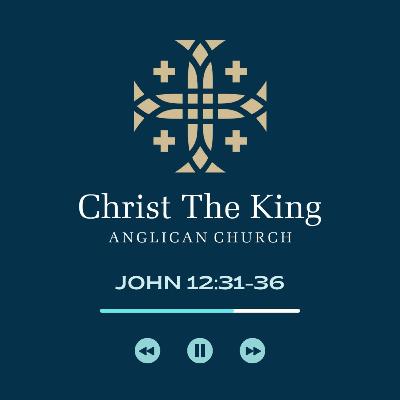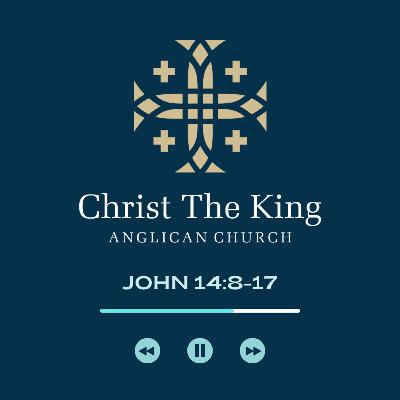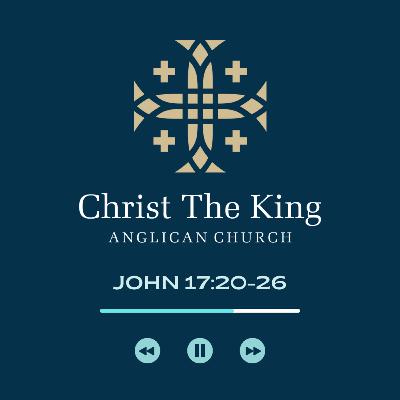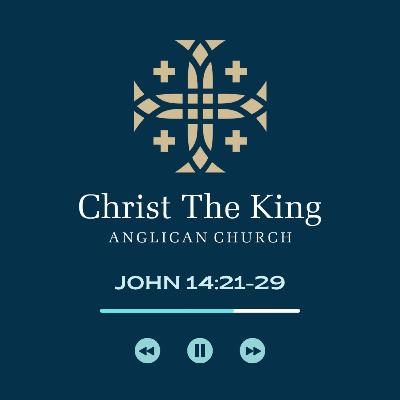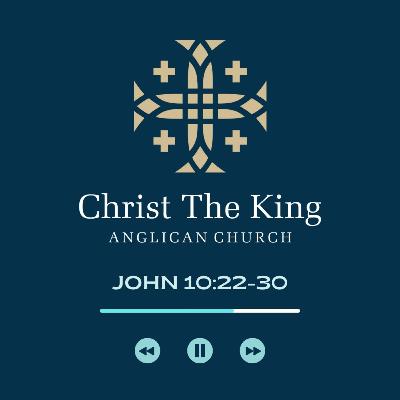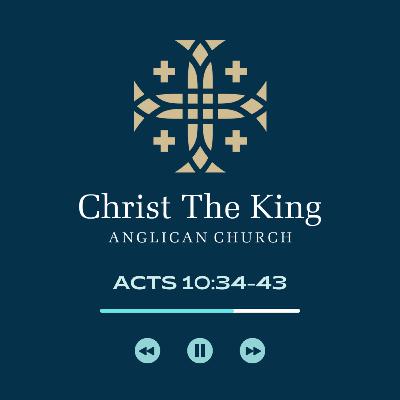Discover Christ the King Anglican Church - Denver
Christ the King Anglican Church - Denver

144 Episodes
Reverse
All Saints' Day isn't just about famous people from history—it's about you. If you know Jesus, you're a saint, an heir to a glorious inheritance! But what does that mean for your life today?We dive into the Beatitudes from the Sermon on the Mount, showing that they aren't a list of achievements to strive for, but a divine promise given to God's people. We explore the life of Colorado's own Clara Brown and discuss what it means to live out the character of the saints—like being meek and merciful—because your ultimate victory is already assured.Press play to discover:Why the Beatitudes are an inheritance, not an assignment.How to live with power under control (meekness).Why the Communion Table is the tangible sign of your sainthood!
Gratitude is what you feel.Thanksgiving is what you do.In The Gospel According to Luke 17:11–19, ten lepers are healed — but only one turns back to give thanks.This story isn’t just about feeling grateful. It’s about returning to Jesus in worship.Let’s be a people marked by thanksgiving — turning gratitude into praise.
Big idea: Use the small faith you have.Feeling overwhelmed by anxiety, grief, or a stubborn problem that won’t budge? In this message Deacon Steven walks Luke 17:5–6 and invites us to stop chasing “more faith” and instead use the mustard-seed faith we already have — trusting Jesus to make small trust do mighty things. Through the mustard-seed and mulberry-tree images, personal testimony, and practical steps, Steven challenges us to name the mulberries in our lives, offer them to God, and pray that God be glorified in our response.Scripture: Luke 17:5–6Topics: mustard-seed faith, anxiety, forgiveness, grief, practical prayer, trusting God in suffering
What does it really mean to “bear fruit” as the church? In John 15, Jesus says, “I am the true vine, and my Father is the vinedresser.” Fruit doesn’t come from striving harder—it comes from abiding in Christ.In this message, we explore three anchors of abiding:Clinging to Christ through faith and His WordBeing nourished by prayer and the SacramentsLiving out loving, costly obedience togetherLike organic fruit, this kind of life may grow slowly and quietly, but it’s rich, nourishing, and lasting.
On Holy Cross Day, we look at John 12 and hear Jesus’ words:“Now is the judgment of this world; now will the ruler of this world be cast out. And I, when I am lifted up from the earth, will draw all people to myself.”The cross is not just a symbol of suffering—it is God’s victory over darkness, His perfect justice, and His invitation to unity and hope.✝️ In this message, we explore:Why God’s judgment is actually good newsHow the cross breaks the grip of evil and shameWhat it means to live in true freedom and hopeHow the cross draws all people into a new kind of familyEven in the midst of sorrow, the cross declares that evil does not win, and Jesus is still drawing all people to Himself.
Hospitality is more than good manners—it’s a glimpse into the very heart of God. In Luke 14, Jesus shows us that true hospitality is rooted in humility and generosity, not in pretense or reciprocity. This sermon explores how every act of welcome, from the smallest kindness to sacrificial generosity, participates in God’s eternal story of making room for us at His table.Join us as we learn how to live into the image of Christ, who gave up His seat for us—and invites us to do the same for others..
Life is full of choices—35,000 of them every day, according to one study. Some are small and forgettable, but others shape our souls and set the course of our lives.In Proverbs 9, Scripture paints a vivid picture: Wisdom sets a feast on one side of the street, Folly sets hers on the other. Both call for our attention. Both invite us in. The question is—which table will we sit at?In this final sermon from our summer series in Proverbs, Pastor Jesse explores how our hearts and our choices form one another, why teachability is at the core of true wisdom, and how Christ himself is the ultimate feast of Wisdom.Join us as we close our time in Proverbs with this message: "Two Invitations: Wisdom or Folly."
In this sermon, the "Nabal" is presented as the committed fool from the book of Proverbs. This isn't about being silly, but about a hardened heart that rejects God. Using the Colorado rivers as an analogy, the sermon challenges us to recognize this dangerous folly in others and, more importantly, in ourselves.You'll learn how to identify a Nabal and avoid their destructive influence. The message explores the subtle ways we can fall into the same traps of spiritual pride and selfishness. Ultimately, it offers hope in the transformative power of Jesus Christ, who can redeem even the most foolish heart.This message is a call to self-reflection and spiritual diligence. Pray for revelation and seek accountability to root out foolishness and live a life guided by God's wisdom.
The Folly of the Scoffer | Proverbs & Luke 7In Proverbs, the “scoffer” is the fool who resists correction, dismisses others, and hides spiritual poverty behind a façade of superiority. In Luke 7, we meet Simon the Pharisee—educated, religious, respected—yet blind to the grace of God right at his table. Meanwhile, a woman of ill repute shows the opposite posture: humility, repentance, and deep love.In this message, we explore how scoffing takes root—through pride, blindness, bitterness, and self-preservation—and how Jesus invites us out of that posture into a life of wonder, discovery, and peace.📖 Key Texts: Proverbs on the scoffer, Luke 7:36–50💡 Theme: From cynicism to humility, from closed hearts to open wonder.
This week at Christ the King Anglican Church, we continue our summer series exploring God’s wisdom in Proverbs—not just as ancient advice, but as a living path toward what is good, true, beautiful, and whole.This message focuses on the Sensual Fool—someone who drifts from wisdom by following appetite, impulse, and escape. Drawing from Proverbs 7 and other Scriptures, we reflect on how the pursuit of comfort, affirmation, and pleasure can slowly pull us away from the life God desires for us.These patterns often feel normal—even harmless. But beneath the surface are deeper aches: wounded desires, addictive drift, and quiet attempts to stay in control.The gospel offers more than just restraint—it offers rescue. Not to deny us joy, but to lead us to a better feast.Reflection questions:What’s one lesser love dulling your desire for God?Where are you saying yes to impulse instead of intimacy with Christ?—📖 Scripture references include: Proverbs 7, Proverbs 21:17, Romans 6, Ecclesiastes 2, Titus 3:3–5, Isaiah 25:6–8, and more.🙏 Subscribe to hear more from our Proverbs series—and may God give you a heart of wisdom.
What does Proverbs mean by “fool”? It’s more nuanced than we think.In this message, Pastor Jesse unpacks two portraits of folly from Proverbs—the simple fool and the reckless fool. Drawing from Scripture, real-life insight, and a little humor (IKEA furniture, anyone?), he shows how recognizing these patterns can actually help us grow in wisdom.Folly isn’t just “out there”—it creeps into our own hearts. But the good news? God doesn’t shame us. He invites us into clarity, truth, and the path of life through Jesus Christ.📖 Featured Texts: Proverbs 1, 7, 10, 12🎯 Topics: Discernment, cultural trends, spiritual growth, biblical wisdom🙏 Includes a practical “homework” challenge for self-reflection
Life doesn't always feel fair, does it? The book of Proverbs promises that the righteous will flourish and the wicked will stumble, but our lived experience often tells a different story. In this sermon, we dive into the wisdom of Proverbs and explore how to read this ancient text faithfully, even when it seems to clash with the brokenness of our world. Discover how "Lady Wisdom" was woven into creation, and why understanding Proverbs ultimately calls us to a patient hope in God's ultimate restoration.
Is Jesus really telling us to never go home, skip our dad’s funeral, and give up all comfort? Or is there something deeper going on?This sermon explores Luke 9:57–62, where Jesus gives a series of hard, even confusing, responses to would-be disciples. At first glance, His words sound extreme—maybe even contradictory to other parts of the Bible. But when viewed in context, they reveal a powerful truth: the call to follow Jesus is both radically disruptive and deeply embedded in ordinary life.In this message, we explore how the Kingdom of God reshapes our priorities, reorders our desires, and meets us in the tension between hustle and rest, ambition and surrender.
The Transforming Power of the Holy Spirit | Pentecost Sermon 2025On the day of Pentecost, everything changed.Before: The disciples were anxious, uncertain, and hiding.After: They were bold, clear, and unstoppable.What happened? The promised Holy Spirit arrived.In this sermon, we explore Pentecost through the lens of transformation — how the Holy Spirit moves us from fear to courage, from confusion to clarity, from isolation to mission. Drawing from John 14:8–17, we see how the Spirit reveals the truth of God, gives us right judgment for real life, and dwells in us as our Comforter and Guide.Whether you’re walking through grief, seeking discernment, or longing for deeper faith, this message invites you to consider:What "after" is the Holy Spirit leading you into?Watch now and invite the Spirit to shine light, give wisdom, and draw you closer to the presence of Christ.
In John 17:20–26, Jesus prays what may be His final public prayer before the cross—and what He prays for is stunning. Not strategy. Not safety. Not even success. But unity. A unity so deep it mirrors the communion between the Father and the Son.This message explores what that kind of oneness means for the Church today—not uniformity, but a Spirit-empowered love that assumes the best in one another, seeks each other’s good, and transcends tribal boundaries.In a fractured world, Jesus says unity is how the world will come to believe. Not through arguments or alignment, but through the witness of a people genuinely connected by divine love.Watch to explore how this prayer still speaks today—and how you can begin living it this week.📖 Text: John 17:20–26🎧 Listen in and reflect on what it means to live out the unity Jesus prayed for.
What kind of peace does Jesus give—and why is it so different from what the world offers? In this sermon on John 14:21–29, Deacon Steven explores the deep connection between fear, sin, and the absence of peace, and how Jesus offers a lasting, soul-restoring peace that begins with confession and communion with God.If you’re tired, anxious, or spiritually restless, this message is for you. Discover the antidote Jesus gives in His final hours—a peace not rooted in performance or perfection, but in His presence and promise.
Explore John 10:22-30 in this sermon that unpacks what it means to hear the voice of Jesus in our lives. Discover how to move beyond the world’s noise, adopt a posture of listening, and respond to God’s clear and constant call. This message challenges us to tune into God’s voice, leading to divine security and a transformed life. Perfect for anyone seeking to deepen their faith!
In this message from John 21, we explore how the risen Jesus creates supernatural unity among His followers — not through shared interests or personalities, but through His presence, His grace, and His invitation to be with Him. From Peter’s restoration to a simple breakfast on the shore, we see how grace heals, binds, and transforms.If you’ve ever felt disconnected, ashamed, or unsure how you fit into the body of Christ, this passage offers hope — and a quiet, powerful invitation: “Come and eat.”
Christ is Risen! The Lord is Risen Indeed! Hallelujah!This Easter, we celebrate more than an empty tomb — we celebrate what the resurrection means for us today. In a world longing for authenticity, identity, and justice, the Risen Jesus meets us with real hope.In this joyful, family-filled service (complete with kids, bells, and baptisms!), we hear the Apostle Peter’s words to a Roman outsider named Cornelius — and discover why Jesus’ life, death, and resurrection are good news for everyone, everywhere.Come rejoice in the truth:Jesus is real.In Him, we are known and made new.And His resurrection is the beginning of a just and renewed world.
On this Palm Sunday, we explore Jesus’ dramatic and deliberate entrance into Jerusalem—a moment that marks the beginning of Holy Week and a turning point in the Gospels. Why do nearly half of the Gospel accounts focus on this final week of Jesus’ life? Because here, He fully embraces His identity as King.In Luke 19, Jesus rides in on a colt, fulfilling ancient prophecy and confronting both religious and political systems. His arrival is peaceful yet powerful, humble yet unignorable. We reflect on what it means for Jesus to enter not only Jerusalem, but also our lives—often not with spectacle, but with quiet authority and a call to transformation.



